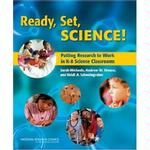"What types of instructional experiences help K-8 students learn science with understanding? What do science educators, teachers, teacher leaders, science specialists, professional development staff, curriculum designers, school administrators need to know to create and support such experiences?
Ready, Set, Science! guides the way with an account of the groundbreaking and comprehensive synthesis of research into teaching and learning science in kindergarten through eighth grade. Based on the recently released National Research Council report Taking Science to School: Learning and Teaching Science in Grades K-8, this book summarizes a rich body of findings from the learning sciences and builds detailed cases of science educators at work to make the implications of research clear, accessible, and stimulating for a broad range of science educators.
Ready, Set, Science! is filled with classroom case studies that bring to life the research findings and help readers to replicate success. Most of these stories are based on real classroom experiences that illustrate the complexities that teachers grapple with every day. They show how teachers work to select and design rigorous and engaging instructional tasks, manage classrooms, orchestrate productive discussions with culturally and linguistically diverse groups of students, and help students make their thinking visible using a variety of representational tools.
This book will be an essential resource for science education practitioners and contains information that will be extremely useful to everyone including parents directly or indirectly involved in the teaching of science."
 |
|||||||||||||
|
|||||||||||||

|
Funded by the National Science Foundation.
We welcome your Feedback. |
